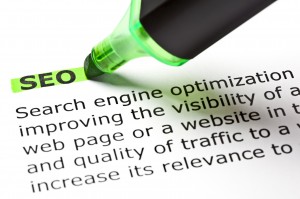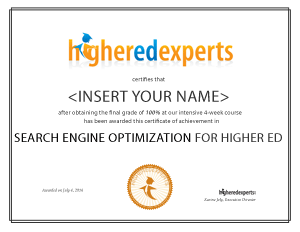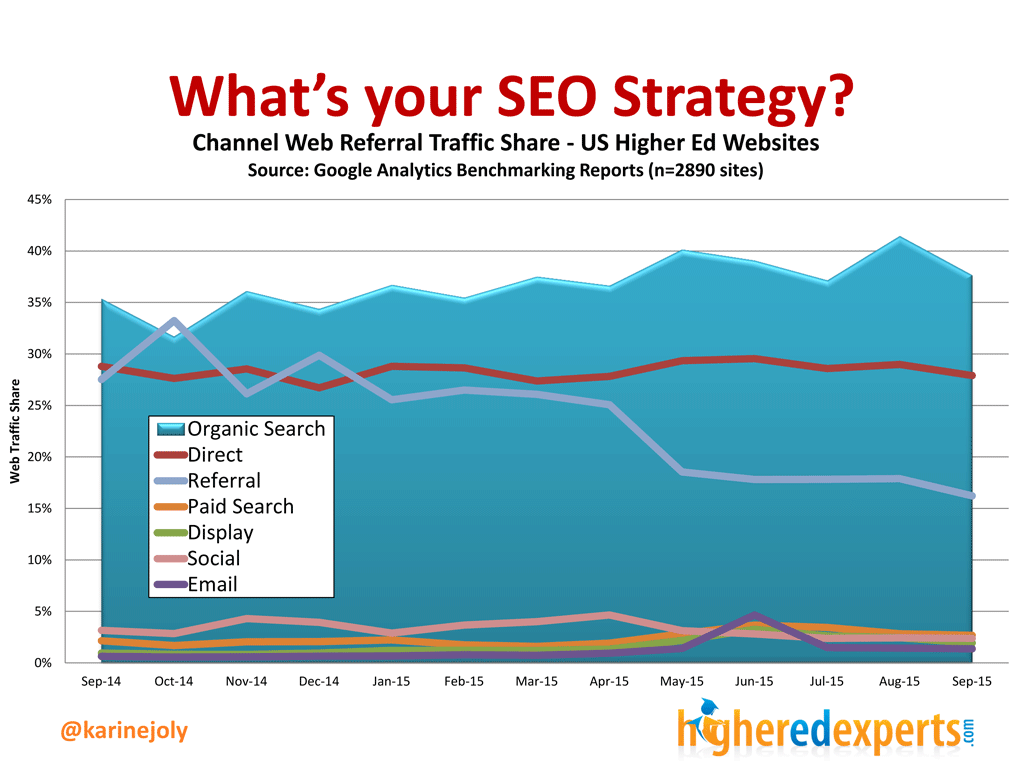SEO mistakes can be costly in higher ed
After what happened at UC Davis with the SEO snafu (you can also read Inside Higher Ed’s article if you don’t have access to the Chronicle) and in light of the 2017 E-Expectations Study results, I thought everybody in higher ed could use a quick overview of the pros and cons of outsourcing SEO versus keeping it internal.
Having worked both as a consultant and internal SEO practitioner, I have been on both sides of the fence in this discussion and see benefits and challenges with each.
Hiring an outside SEO firm

Pros
The biggest benefit of hiring an outside SEO firm for your college or university is the ability to quickly get your SEO program off the ground. SEO firms have experience working with multiple clients and have a base-level understanding of what is needed to launch an SEO program quickly. This can be a great approach when an institution realizes the need for better search results, but doesn’t yet have the internal infrastructure to support a strategic SEO program.
Another benefit is that since an SEO agency has experience working with different clients, they will likely recognize some of the pitfalls that the inexperienced may encounter. Out of the gate, they will likely make recommendations that will have the biggest benefit, similar to what they have seen with other clients. To show their worth, they will want to find quick wins. For this reason, they will likely not suggest things that a novice may want to try.
Another pro is that if you like the results you have seen (after, of course, verifying that the results are as they seem), you can continue working with the agency. However, if you do not like the results you see, you can change agencies or bring the SEO program in-house. Hiring an outside agency gives you flexibility in how you work. It can also provide the ability to scale your higher education SEO program up rapidly if you find that it would be beneficial to do more of what has worked so far.
Cons
As in the case of UC Davis, we can see that an SEO firm may over-promise. This is certainly not true of all agencies, but over-promising does happen. Be cautious of anyone who promises rankings. Run for the hills if they promise a page one, position one ranking. That is simply not something anyone can promise. It is not within their control. There are too many factors that go into a position one ranking for anyone to promise that it will happen. The goal is to influence rankings in hope of increasing relevance, authority, and favor in search engines on particular topics and keywords. When done well, that will likely happen. However, no one can promise a top ranking and be considered truthful.
Another con of hiring an outside firm is the temptation for the agency to not customize their approach to the unique nature of a particular institution. A college or university has a brand and the brand must be protected. What may work well for one school’s brand may not be a good fit for another school’s brand. There are definitely major pillars of SEO that need to be considered in any situation, but the way in which they are implemented can and should be customized to the unique nature of a university’s brand. There is no one-size-fits all approach to SEO in higher ed.
Finally, a major con that still happens today (even in higher education SEO) is the use of gray or black hat methods for achieving high rankings. This is dangerous, often unethical, and should be avoided at all costs. The short-term appeal of quickly increasing rankings should be weighed against the larger potential penalty that could be issued if the institution is found to use these sketchy techniques. Some examples that I have encountered that fall into this category are in the realm of paying for links, creating fake websites with gobbledygook text with links back to a program page, and keyword stuffing. While many have avoided these tactics for some time, they are still in use. These tactics should be avoided at all costs. They will only cause more harm than good.
Keeping SEO internal
Pros
The greatest benefit of keeping your SEO in-house is the familiarity with your brand and vested interest of those who maintain the SEO strategy. An internal SEO will likely be much more familiar with your brand and all of its nuances. There will be an inherent notion of what would be an acceptable practice in support of your mission and what would be outside of what is helpful in maintaining the brand. Staying on-brand is important. So much of SEO today is about building authority around key differentiators and showing relevance to searchers. An internal SEO will know more about the amazing things that are happening at the school than an outside practitioner would know.
 Another benefit of having internal higher ed SEO practitioners is that they will more easily be a part of the planning process for new initiatives, offering SEO guidance along the way. If there is an event, new academic program, new opportunity, etc., at a college or university, an internal employee who understands and specializes in strategic SEO can help plan approaches for getting the most out of these initiatives. Since it is an employee, it will be much easier to be part of the early conversations, seeing potential areas of opportunity and weakness—all while connecting the new initiative to other SEO strategies that are already in place.
Another benefit of having internal higher ed SEO practitioners is that they will more easily be a part of the planning process for new initiatives, offering SEO guidance along the way. If there is an event, new academic program, new opportunity, etc., at a college or university, an internal employee who understands and specializes in strategic SEO can help plan approaches for getting the most out of these initiatives. Since it is an employee, it will be much easier to be part of the early conversations, seeing potential areas of opportunity and weakness—all while connecting the new initiative to other SEO strategies that are already in place.
An additional benefit of keep SEO in-house is the long-term ability of the SEO to see the strategy through and continue to push for new opportunities. As the old adage goes, if you give a man a fish he will eat for day, but if you teach a man to fish he will eat for a lifetime. You can buy some SEO services for a short while and see some temporary benefits, or you can invest in the internal knowledge to provide long-term benefits in SEO that continues to grow and develop.\
Cons
The greatest challenge with keeping SEO in-house is the potential knowledge gaps that may exist. There are hundreds of SEO ranking factors that should be considered. If someone does not have a great deal of experience or background knowledge of what goes into search engine rankings, then the strategy will likely be missing key components. An understanding of the interplay between the many ranking factors is something that comes with training and experience. It is possible to learn these factors and get up to speed, though it does take practice.
Another challenge with internal SEO, especially for those who have not been doing it for long, is impatience. SEO changes happen over months, not days or weeks like we are used to seeing with other marketing channels. SEO is the slow-and-steady-wins-the-race marketing channel. When we do not see immediate results, it can be discouraging. That is why it is important to have patience and continue working through the SEO strategy without changing gears too quickly.
Finally, a challenge with keeping SEO in-house is that there are many moving pieces to SEO that requires internal buy-in from multiple players/departments. There is a necessary collaboration between marketing, PR, IT, creative, academics, and supporting administration for SEO to be done well. There are politics involved. There are personalities involved. Some things will go smoothly, while others will take time. This is not only true of SEO—it is true of other initiatives, as well. However, when working with such an important area of higher education marketing, it is important to recognize this challenge. It is worth tackling the challenge head-on, recognizing that the long-term benefits will outweigh temporary impediments.
Making educated SEO decisions in higher education
 In summary, there are pros and cons for both options. Hiring an outside SEO agency can be helpful if you do not have the ability to do it in-house and need to quickly stand up an SEO program. However, keeping SEO in-house has greater potential for long-term SEO benefits. Even considering both options simultaneously can be beneficial. Hiring an outside firm to initiate the SEO program while hiring or training internal employees for SEO can provide the best of both worlds.
In summary, there are pros and cons for both options. Hiring an outside SEO agency can be helpful if you do not have the ability to do it in-house and need to quickly stand up an SEO program. However, keeping SEO in-house has greater potential for long-term SEO benefits. Even considering both options simultaneously can be beneficial. Hiring an outside firm to initiate the SEO program while hiring or training internal employees for SEO can provide the best of both worlds.
Ultimately, my biggest recommendation, regardless of which approach is used, is to train internal talent on at least the basics of SEO. It can help keep an external agency honest and, if the employee finds he or she enjoys it, can have a long-lasting positive impact in search results.
Keep in mind that SEO is not a once-and-done thing. It takes a practitioner who is able to know the intricacies and adjust tactics to get the most out of it—all while maintaining realistic expectations in what is achievable.
Meet the Faculty: Joshua Dodson
Higher Ed Experts is a professional online school for digital professionals working in universities and colleges.
When you take a professional certificate course with us, you get a chance to upgrade your skills by working on your projects, interacting with classmates just like you and getting detailed personalized feedback from your instructor.
 Joshua Dodson is a Google Analytics qualified web expert who has worked with numerous colleges and universities to improve their web presence and better understand their user trends. Before joining Bentley University as Director of Digital Marketing, Dodson worked as the Director of SEO at SNHU and the Web Strategy and SEO Administrator for Eastern Kentucky University. He has taught hundreds of higher education marketing professionals how to use analytics and SEO through the courses he teaches for Higher Ed Experts.
Joshua Dodson is a Google Analytics qualified web expert who has worked with numerous colleges and universities to improve their web presence and better understand their user trends. Before joining Bentley University as Director of Digital Marketing, Dodson worked as the Director of SEO at SNHU and the Web Strategy and SEO Administrator for Eastern Kentucky University. He has taught hundreds of higher education marketing professionals how to use analytics and SEO through the courses he teaches for Higher Ed Experts.
Joshua teaches Higher Ed Expert’s 4-week online course on Search Engine Optimiation (SEO) for Higher Education as well as 3 other advanced courses.
Tags: Higher Ed Experts Faculty, Higher Ed Marketing, Higher Ed News

